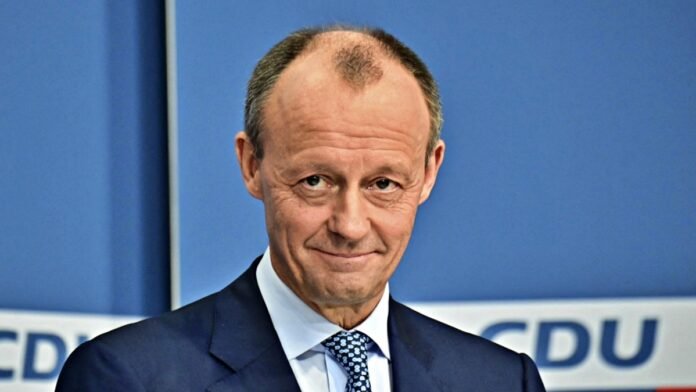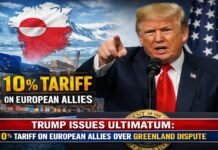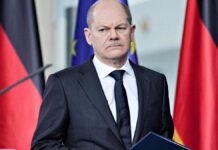
Key Points:
- The Christian Democratic Union (CDU), led by Friedrich Merz, emerged victorious in Germany’s 2025 federal election with 28.5% of the vote.
- The far-right Alternative for Germany (AfD) achieved its best-ever result, securing 20.8%, while the Social Democrats (SPD) suffered their worst performance at 16.4%.
- Outgoing Chancellor Olaf Scholz accepted defeat, calling the result “bitter” for the SPD.
- Coalition negotiations are expected to be complex, with Merz ruling out collaboration with the AfD.
- European leaders congratulated Merz, emphasizing hopes for a stable government and strengthened EU ties.
Berlin: Germany’s snap federal election on February 23, 2025, has reshaped the country’s political landscape. The conservative Christian Democratic Union (CDU) and its sister party, the Christian Social Union (CSU), secured a decisive victory with 28.5% of the vote. This positions CDU leader Friedrich Merz as the likely successor to Olaf Scholz as Chancellor.
Despite this win, the CDU fell short of an outright majority in the Bundestag, necessitating coalition talks to form a government. The far-right Alternative for Germany (AfD) surged to second place with 20.8%, marking its best-ever performance, while Scholz’s Social Democratic Party (SPD) recorded its worst result at 16.4%.
Merz’s Victory Speech: “The World Isn’t Waiting for Us”
In his first remarks after the results, Friedrich Merz expressed optimism about forming a government swiftly. “Tonight we celebrate; tomorrow we get to work,” he said. Acknowledging the urgency of global and domestic challenges, he added, “The world isn’t waiting for us.”
Merz emphasized his commitment to addressing Germany’s economic recession and immigration issues while reaffirming his pro-European stance. However, he ruled out forming a coalition with the far-right AfD, despite their significant gains.
Rise of the Far-Right AfD: A Historic Moment
The AfD’s performance doubling its vote share from the previous election has raised concerns across Germany and Europe. Alice Weidel, AfD’s leader, called it a “historic achievement” and expressed readiness to govern. However, all major parties have pledged to maintain a “firewall” against collaborating with the AfD due to its anti-immigration and Eurosceptic policies.
The AfD’s rise reflects growing voter frustration over immigration and economic stagnation. Analysts attribute this surge to recent high-profile crimes involving migrants and dissatisfaction with Scholz’s handling of energy policies.
Outgoing Chancellor Olaf Scholz Accepts Defeat
Olaf Scholz conceded defeat shortly after exit polls were announced. “This is a bitter result for our Social Democratic Party,” he said. Despite his party’s poor performance, Scholz congratulated Merz on his victory and pledged support for a smooth transition.
Scholz’s three-way coalition government with the Greens and Free Democratic Party (FDP) collapsed in late 2024 due to disagreements over fiscal policies and energy reforms. This triggered the snap election that has now ended his tenure as Chancellor.
European Leaders React: Calls for Stability
European leaders were quick to congratulate Friedrich Merz on his victory. French President Emmanuel Macron emphasized collaboration for a “strong and sovereign Europe,” while UK Prime Minister Keir Starmer expressed hopes for deepening bilateral ties.
US President Donald Trump also weighed in, praising Germany’s right-wing shift as a reflection of global dissatisfaction with liberal policies on energy and immigration.
Challenges Ahead: Forming a Coalition Government
Despite winning the most votes, Merz faces significant challenges in forming a coalition government. With 208 seats in the Bundestag—short of the 316 needed for a majority—the CDU/CSU will need partners to govern effectively.
Merz is expected to approach Scholz’s SPD or the Greens for coalition talks. A two-party “grand coalition” between CDU/CSU and SPD seems most likely but could face internal resistance from both sides due to ideological differences.
Coalition negotiations are expected to be lengthy and complex, potentially delaying critical policy decisions on Germany’s economy and foreign relations.
Key Election Results:
| Party | Vote Share (%) | Seats in Bundestag |
|---|---|---|
| CDU/CSU | 28.5% | 208 |
| AfD | 20.8% | 152 |
| SPD | 16.4% | 121 |
| Greens | 11.6% | 83 |
| Left Party | 8.8% | 63 |
| BSW | 5% | 31 |
What Lies Ahead for Germany?
- Economic Recovery: Germany faces significant economic challenges, including high energy costs and sluggish growth. Merz has promised tax cuts and deregulation to revitalize Europe’s largest economy.
- Immigration Reform: Immigration remains a divisive issue after recent attacks linked to asylum seekers fueled public demand for stricter policies.
- Foreign Policy Realignment: Under Merz’s leadership, Germany may pivot towards strengthening EU defense capabilities amid shifting US-Europe dynamics under Trump’s administration.
- Climate Policy: While maintaining commitments to climate neutrality by 2045, Merz is expected to prioritize economic stability over aggressive environmental reforms.
A New Era for German Politics
The 2025 federal election marks a turning point for Germany as Friedrich Merz prepares to lead Europe’s largest economy through turbulent times. With rising populist movements like the AfD reshaping political discourse, coalition-building will be critical in determining Germany’s domestic stability and international role.
As negotiations commence, all eyes are on Berlin to see how Merz navigates these challenges while delivering on promises of economic revitalization and governance stability by mid-April a timeline he has set for forming his government.






















































